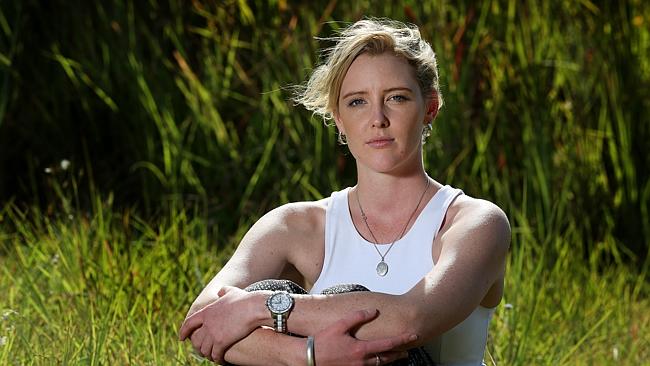
Claire Peterson, 22, from the Gold Coast will ask her GP for the test. Picture: Adam Head Source: News Limited
WOMEN in their 20s should make the “eggtimer” test as routine as having a Pap smear, fertility doctors say.
Senior Monash IVF specialist Dr Kee Ong believes the simple blood test, which provides an estimate of how many eggs a woman has in store and her fertility deadlines, gives women an early indicator as to whether they should start a family sooner rather than later.
INFERTILITY: Waiting until age 35 pushing it
DOWNTURN: Demand for IVF dips in Queensland
The blood test, which costs between $70 and $80, is available through GPs.
Dr David Molloy, clinical director of Queensland Fertility Clinic, also supports women making early fertility testing a part of their health check-ups.
“Young women take so much initiative to ensure they won’t get pregnant and in keeping up with their Pap smears but they must also look forward to the time when they may be ready to start a family
“This test is something that needs to become part of our routine health checks, a normal and necessary part of women’s health,” Dr Ong said.
“Women should have the test by the time they turn 30 or earlier if they have a medical history that is known to affect fertility,” he said.
“The frequency that women should take the test will depend on the results. Perhaps it will be every one or two years,” Dr Ong said.
Stop motion video creates a detailed record of one woman’s journey through pregnancy
Women are born with about one million eggs and the number declines with age through natural attrition and ovulation. The rate at which the egg stores decline varies greatly in each case. The test measures the hormone AMH or anti-mullerian hormone.
Dr David Molloy said: “If a 29-year-old has low AMH then they have the option to freeze their eggs or move on and have a baby.”
Dr Ong thinks the egg- timer test is important for women who are not thinking about having babies for the next couple of years.
“There are so many reasons we are delaying having a family.
“Women are focusing on their careers; perhaps they are not in the right financial position; perhaps it’s just a lifestyle choice or Mr Right is just not ready,” Dr Ong said.
“Egg freezing at 30 years of age is going to be much better than undergoing IVF at 35 years,” he said.
Claire Peterson from the Gold Coast is 22. The childcare worker loves children and plans to have two or three of her own. “I want a family in four years and I would love to know everything is all right and I’m on track to do that.
“I plan to ask my GP about the test.’’
* * *
Sonia Kruger discusses her pregnancy 0:41

TV Host Sonia Kruger discusses her pregnancy and the IVF treatment she received during the process.
- news.com.au
- 25 Aug 2014
- Entertainment
BABY BOOM FOR OVER 40S
FORTYSOMETHINGS are blooming.
Australia’s birthrate has fallen to its lowest since 2006 but bucking the trend are women aged 40 to 44, according to new 2013 birth data from the Australian Bureau of Statistics. The fertility rate in this age group has tripled in the last three decades. Despite the birth dip, multiple births have also increased.
In 2013 the median age of mothers nationally was 30.8 and fathers 33 years.
“We saw a total of 308,100 births in 2013, which is down on the 309,600 from the previous year,” said Denise Carlton from the ABS.
In Queensland, 2226 children were born to mothers in their early 40s, in 2003 the number was 1237. Almost 100 babies were born to mothers in their late 40s.
Teresa Stock from Edens Landing is 42 and mother to twin babies.
“I think that older mother numbers are rising as there are more options for women these days. I am single and years ago if you had no partner you would just have to accept that you could not have children. Today thanks to fertility treatment and a sperm donation I am able to do it alone,” the veterinarian said.
While improvements in assisted reproductive technology have helped boost the fertility of older women, Samantha Stevens, 42, from the Gold Coast is mother to baby Anghus, who was conceived naturally.
“Basically, I was waiting and waiting for the right man. I was so lucky to meet my husband. At 48 he is a proud dad. Anghus is so treasured I think our age really makes no difference,” she said. In Queensland in 2013 the median age of fathers was 32.1 and a total of 701 men over 50 had children.

. Source: ThinkStock
STARS WHO WAITED TO HAVE KIDS
Nicole Kidman: Baby at 41
Geena Davis: Twins at 48
Mariah Carey: Twins at 41
Madonna: Baby at 41
Holly Hunter: Twins at 47
Helen Fielding (author of Bridget Jones’s Diary): Babies at 43 & 48
Sonia Kruger: Pregnant at 49
